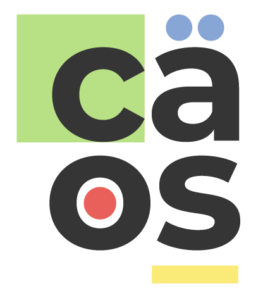
Let’s make some CAOS! The use of drama-based pedagogies in Higher Education.
Let’s make some CAOS! The use of drama-based pedagogies in Higher Education.

How can we ensure that different standpoints, particularly those often silenced and neglected, are included and that students play an active role in making their experience of learning truly memorable and transformative? CAOS – CAmpus On Stage builds on these questions and recent calls to develop appropriate pedagogical tools to teach complex issues (e.g., environmental justice) within a socio-ecological approach to Higher Education (Colombo et al., 2024). To build a future-proof education, we need to focus not only on ‘what’ we need to teach, but also the ‘how’ (Mason et al., 2024). Our approach shows that drama techniques can enable us to address these questions.
Our project is an interdisciplinary and international collaboration. The project team consists of Dr. Lívia Regina Batista-Pritchard and Dr. Laura Colombo from Sustainable Futures, Business School at the University of Exeter, Penryn Campus; Dr. Tiago de Melo Cartaxo and Dr. Caroline Keenan, from HaSS Cornwall at the University of Exeter, Penryn Campus; in collaboration with Dr. David Monciardini, Dr. Mario Aldo Cedrini, and Dr. Alice Scavarda from the Università degli Studi di Torino. It also included experts in theatre and dramatherapy. The project involved over 100 students across different modules.
In January 2025, we delivered a small, in-person workshop to discuss the importance of drama-based pedagogies with Nick Bailey, one of the experts involved in the project, and prepared the interventions we would be experimenting with in Term 2. Interventions included activities such as: mock trial, collective reading, interview-based podcast, and embodied learning. We also conducted a preliminary literature review about the use of drama in Higher Education. Although this technique is incipient in management and legal education, it has been evidenced within Education for Sustainable Development. In this case, researchers pointed out that it can prepare students “for a future that is still unknown” (Leal Filho and Pace, 2016, p. 3). There is evidence that using drama in teaching for sustainability is effective and impactful. Research shows increased learners’ engagement (Österlind, 2018; Paschall and Wüstenhagen, 2012), enhanced critical – and creative – thinking (Baker and Baker, 2012), and development of a sense of connectedness (Davis and Tarrant, 2014; Etherton and Prentki, 2006; Lehtonen et al., 2020), not only with other people but also towards non-human and more-than-human worlds (see, e.g., Wall et al., 2019).
Since then, we focussed on our experimentations in class, and building our case studies. Students were very receptive to our interventions. For example, for the interview-based podcast as an assessment, one student has said that: “The best thing about this module was the emphasis on social issues and creating social change. It is so important that you send us out as graduates hopeful about making the world a better place. I particularly appreciated the engagement with local organisations helping us to contextualise the content”. Another student called it “a breath of fresh air”. We also engaged with a local graphic designer to create a website to showcase our activities, and build a broader network.
Moving forward, we are planning to gather student feedback through a ‘friendship conversations’ method to understand the real impact of drama-based pedagogies in their learning journey. Having the student voice in this project will be very beneficial to its long-term impact. In reflection, we would like to have a better structure for these interventions, beyond the case studies, and to embed them in the curricula. It will be beneficial to also gather feedback from the staff involved, to gain a better understanding of possible institutional barriers to the implementation of these activities.
If you’d like to be involved, please check our website: https://www.campusonstage.org/ and get in touch with us.
Further reading:
Baker, D. F. and S. J. Baker (2012). ‘To “catch the sparkling glow”: A canvas for creativity in the management classroom’, Academy of Management Learning & Education, 11(4), pp. 704-721. https://doi.org/10.5465/amle.2010.0003
Colombo, L. A., C. Moser and K. Muehlfeld (2024). ‘Sowing the seeds of change: Calling for a social-ecological approach to management learning and education’, Academy of Management Learning & Education, 23(2), pp. 207-213. https://doi.org/10.5465/amle.2024.0086
Davis, S., and M. Tarrant (2014). ‘Environmentalism, stories and science: Exploring applied theatre processes for sustainability education’, Research in Drama Education: The Journal of Applied Theatre and Performance, 19(2), pp. 190–194. https://doi.org/10.1080/13569783.2014.895613
Etherton, M. and T. Prentki (2006). ‘Drama for change? Prove it! Impact assessment in applied theatre’, Research in Drama Education, 11(2), pp. 139-155. https://doi.org/10.1080/13569780600670718
Leal Filho, W. and P. Pace (2016). Teaching education for sustainable development: implications on learning programmes at Higher Education. In: W. Leal Filho and P. Pace (eds.). Teaching Education for Sustainable Development at University Level, pp. 1-6. Springer International Publishing. https://doi.org/10.1007/978-3-319-32928-4_1
Lehtonen, A., E. Österlind, and T. L. Viirret (2020). ‘Drama in education for sustainability: Becoming connected through embodiment’. International Journal of Education & the Arts, 21(9). https://doi.org/10.26209/ijea21n19
Mason, K., L. Anderson, K. Black, and A. Roberts (2024). ‘A shout-out for the value of management education research: ‘Pedagogy is not a dirty word’’, British Journal of Management, 35, pp. 539-549. https://doi.org/10.1111/1467-8551.12805
Österlind, E. (2018). ‘Drama in higher education for sustainability: Work-based learning through fiction?’, Higher Education, Skills and Work-Based Learning, 8(3), pp. 337–352. https://doi.org/10.1108/HESWBL-03-2018-0034
Paschall, M. and R. Wüstenhagen (2012). ‘More than a game: Learning about climate change through role-play’, Journal of Management Education, 36(4), pp. 510-543. https://doi.org/10.1177/1052562911411156
Wall, T., E. Österlind, and J. Fries (2019). Arts-Based Approaches for Sustainability. In W. Leal Filho (Ed.), Encyclopedia of Sustainability in Higher Education, pp. 50–56. Springer International Publishing. https://doi.org/10.1007/978-3-030-11352-0_523
For more information please contact:
This post was written by Dr Lívia Regina Batista-Pritchard
Related Links
Funder
Global Classrooms Fellowship


